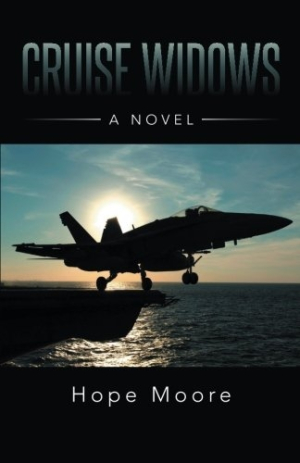It looks like you've stumbled upon a page meant to be read by our code instead of viewed directly. You're probably looking for this page.
Cruise Widows
This historical novel shows what daily life was like for women whose husbands were away at war.
Hope Moore’s Cruise Widows tells the story of five Navy wives and the lives they lead while their husbands are away on a nine-month tour of duty. Sharing in their husbands’ absence, the wives stay in touch with regular get-togethers. Inspired by the author’s own experience as a “cruise widow,” the story reads as a detailed account of the wives’ activities, with glimpses into enlisted life.
The book’s introduction describes the wives and the ways in which they met their husbands. With five characters to develop, the author uses broad strokes to describe their physical appearances and where they’re from. The story, told in the third person, then careens from one wife to another. With their husbands away for almost a year, it would seem that the women’s longings and tested marriages would be a big part of the story; this is not the case. Instead, the novel is not much more than a rote list of each woman’s daily routines.
The book was written in 2014, but it is actually set much earlier. The temporal setting is established two-thirds of the way through, when a reference is made to an officer having served in Korea. Words like “skivvies,” “coolies,” and “trousseau,” along with sentiments about what makes a good wife, what is and isn’t women’s work, and notions like “son and heir” clarify that the novel is a snapshot from an earlier era. One woman even advocates domestic violence when a young wife spends too much money on clothing: “Nan said, ‘If she won’t listen to reason, he should just give her a good beating!’ As a Southerner, Nan knew this solution had worked in lots of marriages, and she saw nothing wrong with it.”
The writing is straightforward but bland, and includes lots of information that doesn’t move the story forward or add depth—such as ten pages on building a carport. With many banal statements such as “Beth was glad to have the water to lessen the hotness in her mouth,” the writing fails to engage interest. The book could use some editing, as verb tense often shifts within sentences, and there are confusing areas that jump back and forth in time.
This novel will be appreciated by those nostalgic for the years immediately after World War II.
Reviewed by
Felicia Topp
Disclosure: This article is not an endorsement, but a review. The publisher of this book provided free copies of the book and paid a small fee to have their book reviewed by a professional reviewer. Foreword Reviews and Clarion Reviews make no guarantee that the publisher will receive a positive review. Foreword Magazine, Inc. is disclosing this in accordance with the Federal Trade Commission’s 16 CFR, Part 255.
